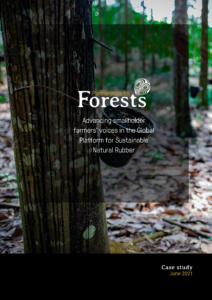It is estimated that 85% of rubber production comes from smallholder farmers, making them an essential part of any effort to improve sustainability in the sector. This case study examines how GPSNR went about improving the representation and voice of smallholders across six countries in a meaningful way.
Recognising the risks that unsustainable natural rubber cultivation poses to forests, people and prosperity, the companies represented by the World Business Council for Sustainable Development (WBCSD) Tire Industry Project (TIP) launched the Global Platform for Sustainable Natural Rubber (GPSNR) in March 2019. As a global, multi-stakeholder initiative it has been working to align supply chain actors to identify and address the social and environmental challenges associated within the industry. Initially when the platform was formed, there were no organisations that represented smallholder rubber farmers in the platform. With 85% of global natural rubber production coming from smallholder farmers2, it was recognised that to bring about lasting change, there needed to be meaningful representation of smallholders in the platform.
Studies of multi-stakeholder initiatives found that the exclusion of smallholders in early stages was partly justified due to the perception that a small selection of smallholders would be unable to consult and represent the entire community. However, the absence of these communities poses a risk to the legitimacy and transparency of any platform. Without their involvement, the platform risks being undermined and makes it likely that deforestation will continue.
To achieve this, the Smallholders Representation Working Group (SHWG) was created and assigned to coordinate actions to identify and secure adequate smallholder representation within GPSNR.
This case study explores the different channels and process taken for engaging a new cohort of smallholder members to the GPSNR, with Partnerships for Forests’ support.

